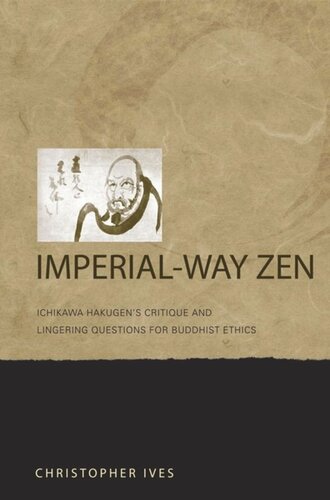

Most ebook files are in PDF format, so you can easily read them using various software such as Foxit Reader or directly on the Google Chrome browser.
Some ebook files are released by publishers in other formats such as .awz, .mobi, .epub, .fb2, etc. You may need to install specific software to read these formats on mobile/PC, such as Calibre.
Please read the tutorial at this link: https://ebookbell.com/faq
We offer FREE conversion to the popular formats you request; however, this may take some time. Therefore, right after payment, please email us, and we will try to provide the service as quickly as possible.
For some exceptional file formats or broken links (if any), please refrain from opening any disputes. Instead, email us first, and we will try to assist within a maximum of 6 hours.
EbookBell Team

4.1
80 reviewsDuring the first half of the twentieth century, Zen Buddhist leaders contributed actively to Japanese imperialism, giving rise to what has been termed "Imperial-Way Zen" (Kodo Zen). Its foremost critic was priest, professor, and activist Ichikawa Hakugen (1902–1986), who spent the decades following Japan’s surrender almost single-handedly chronicling Zen’s support of Japan’s imperialist regime and pressing the issue of Buddhist war responsibility. Ichikawa focused his critique on the Zen approach to religious liberation, the political ramifications of Buddhist metaphysical constructs, the traditional collaboration between Buddhism and governments in East Asia, the philosophical system of Nishida Kitaro (1876–1945), and the vestiges of State Shinto in postwar Japan.
Despite the importance of Ichikawa’s writings, this volume is the first by any scholar to outline his critique. In addition to detailing the actions and ideology of Imperial-Way Zen and Ichikawa’s ripostes to them, Christopher Ives offers his own reflections on Buddhist ethics in light of the phenomenon. He devotes chapters to outlining Buddhist nationalism from the 1868 Meiji Restoration to 1945 and summarizing Ichikawa’s arguments about the causes of Imperial-Way Zen. After assessing Brian Victoria’s claim that Imperial-Way Zen was caused by the traditional connection between Zen and the samurai, Ives presents his own argument that Imperial-Way Zen can best be understood as a modern instance of Buddhism’s traditional role as protector of the realm. Turning to postwar Japan, Ives examines the extent to which Zen leaders have reflected on their wartime political stances and started to construct a critical Zen social ethic. Finally, he considers the resources Zen might offer its contemporary leaders as they pursue what they themselves have identified as a pressing task: ensuring that henceforth Zen will avoid becoming embroiled in international adventurism and instead dedicate itself to the promotion of peace and human rights.
Lucid and balanced in its methodology and well grounded in textual analysis, Imperial-Way Zen will attract scholars, students, and others interested in Buddhism, ethics, Zen practice, and the cooptation of religion in the service of violence and imperialism.